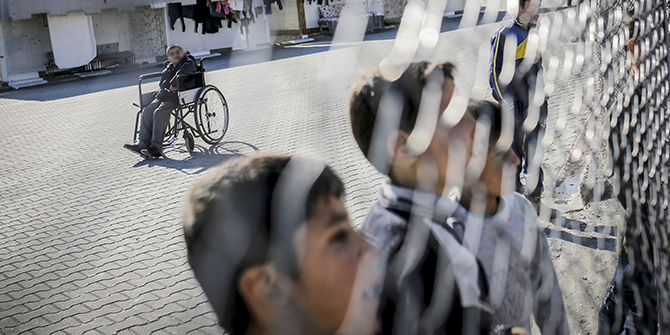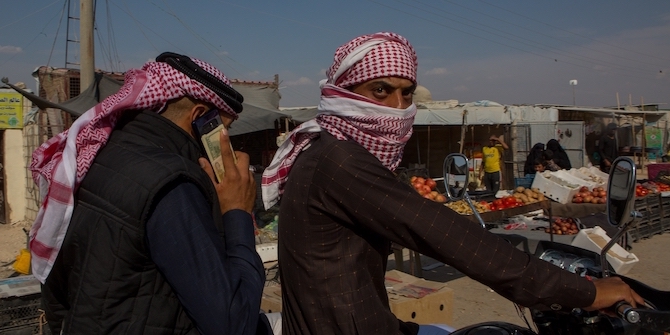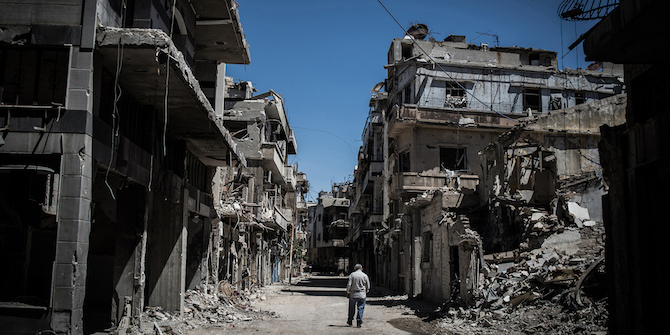by Jouni Häkli and Kirsi Pauliina Kallio

Due to protracted conflict in Syria, 6.2 million people have been internally displaced and over 5.6 million people have sought refuge abroad. The overwhelming majority of these forcibly displaced people live outside camps, in countries neighbouring Syria, where the dominant discourse about asylum seekers and refugees emphasises their social and economic forms of self-reliance. Together with Dr Elisa Pascucci, we studied the experiences of refugees and asylum seekers in Cairo, mainly through thematic interviews. Aiming to understand refugeeness as a subjective life situation, our research identifies significant controversies within the dominant discourse, which aligns itself with United Nations High Commissioner for Refugees (UNHCR) policies that support refugee self-settlement.
In effect, forcibly displaced Syrians face contradictory expectations to demonstrate their deservingness as a refugee. According to UNHCR materials directed at asylum seekers and refugees, such as the leaflet titled Services for Syrians Registered in Greater Cairo, they are instructed to simultaneously demonstrate their resilience and show vulnerability. In particular, the latter may be used as way to facilitate access to better social services and possibly the permission to resettle in a third country. Through our interviews, we found that these contradicting expectations encouraged the development of ambiguous forms of subjectivity and positionality (people’s sense of self as asylum seekers and refugees).
What it means to be a forcibly displaced Syrian does not form univocally but rather gains meaning and significance contextually. There are notable differences in the ways in which refugeeness is negotiated in different contexts. Both formal and informal encounters contribute to defining an individual’s sense of self as an asylum seeker or a refugee. For instance, more formalised contexts include refugee encounters with UNHCR officers who expect to see signs of self-reliance and vulnerability. Less formal settings may look like refugees negotiating membership in a local community.
Often, there is an emphasis on the negative consequences asylum seekers face due to a pressure to internalise the refugee identity promoted by the international refugee regime. As such, people become the self-reliant and vulnerable subjects proposed by current international humanitarian policies, which frame the refugee-subject as a dependent, passive, subordinate, and voiceless individual.
The overemphasis of such aspects conceals the agency of asylum seekers and refugees, and reinforces the predominant view that they are passive recipients of humanitarian support. When approached from the experiential perspective of asylum seekers and refugees themselves, refugeeness can be seen as a more complex situation. Focus on people’s capacities to experience the identities construed by the humanitarian regime is key here. Dealing with contradictory expectations about what it means to be a deserving asylum seeker, we argue, means that refugeeness remains an open-ended subjectivity.
Hence, refugeeness allows for different possibilities to demonstrate political agency. Refugeeness as political subjectivity is not about being governed by internalised identities but rather about the ways in which refugees form their personal stances in response to different and at times highly challenging life situations, as was the case with the forcibly displaced Syrian family interviewed in Cairo.
Our research traces experiences of refugeeness through attention to situations in which our interviewees had something at stake in their implicit or explicit self-definition as an asylum seeker or a refugee. These events are instances during which they come to experience contradictory expectations from humanitarian agencies. In particular, asylum seekers and refugees are expected to demonstrate their ability to support themselves and their family, while also portraying themselves as exceptionally vulnerable people. In this regard, key elements in our engagements with our research participants have been their expressions of emotions, whether for example feelings of fear when recalling past events, distressing experiences related to challenging situations during an asylum interview, tacit awareness of critical moments when gaining refugee status, or learning about new possibilities for resettlement. Such emotion-laden situations are important because they foreground the political subjectivities of asylum seekers and refugees, and reveal how refugeeness arises from their encounters with the humanitarian regime.
Our engagement with an asylum-seeking Syrian family in Cairo illustrated ways in which ambivalences towards practices of migration control and humanitarian provisions are expressed through emotion. We interviewed the family six months following their illegal arrival in Cairo, after Egypt issued visa restrictions to Syrians in 2013. Because of their precarious situation, both economically and legally, the family was distressed and uncomfortable; the mother and father were ambivalent about their future plans, at times demonstrating their resilience, while also showing vulnerability. Their refugeeness was also enacted in gendered ways. On one hand, the mother expressed vulnerability by pleading for help in various aspects of the family’s everyday life, ranging from winter clothes for children, to cooking oil to electric heating for their home. On the other hand, the father highlighted the family’s resilience by stressing that he did not have any problems, and that all he wanted was to find a job. What began as a tense interview, ended with a quarrel about the family’s future plans. The mother hoped to find opportunities for resettlement while the father asserted that they would not move anywhere.
There is no doubt that many forcibly displaced people, such as the underprivileged Syrian asylum seekers and refugees who currently live in the urban fabric of Lebanese, Jordanian, Egyptian, Turkish cities, and beyond, are in particularly vulnerable positions. However, their circumstances do not mean an end to their agency. Asylum seekers and refugees constantly negotiate their identities in relation to the state, humanitarian actors, and the host communities they encounter, as both deserving and self-serving receivers of aid.
 Jouni Häkli is Professor of Regional Studies and directs the Space and Political Agency Reseach Group (SPARG) in Tampere University, as part of the Academy of Finland Centre of Excellence (RELATE). His research lies at the intersection of political geography and global and transnational studies, with focus on political subjectivity and agency, forced migration and transnationalisation.
Jouni Häkli is Professor of Regional Studies and directs the Space and Political Agency Reseach Group (SPARG) in Tampere University, as part of the Academy of Finland Centre of Excellence (RELATE). His research lies at the intersection of political geography and global and transnational studies, with focus on political subjectivity and agency, forced migration and transnationalisation.
 Kirsi Pauliina Kallio works as Professor of Regional Studies at Tampere University, Finland. She develops her research as part of the RELATE Centre of Excellence and the Space and Political Agency Research Group. Her current research focuses on the relational spatiality of the humanitarian border, which she approaches from the perspective of experienced refugeeness.
Kirsi Pauliina Kallio works as Professor of Regional Studies at Tampere University, Finland. She develops her research as part of the RELATE Centre of Excellence and the Space and Political Agency Research Group. Her current research focuses on the relational spatiality of the humanitarian border, which she approaches from the perspective of experienced refugeeness.
This blog post and others in the series are based on presentations during a conference organised by the LSE Middle East Centre on 7–8 March 2019, titled ‘Between Institutional Resilience to the Syrian Refugee Crisis and the Resilience of Syrian Refugees’.
In this series:
- Questioning Dominant Refugee Narratives and Research Methodologies by Yasmine Kherfi
- Contested Meanings of Resilience Building: How Great Expectations in Brussels are Dashed in Beirut by Tamirace Fakhoury
- Three Years of the Jordan Compact: The (Gendered) Challenges of Providing Work Permits for Syrian Refugees by Lewis Turner
- Resilience and Relationality: the Agency of Pious Syrian Refugee Women by Umut Ozkaleli
- Why Ethnography is Important for Refugee-related Research by Sarah A Tobin






